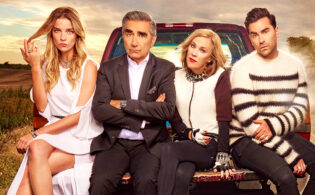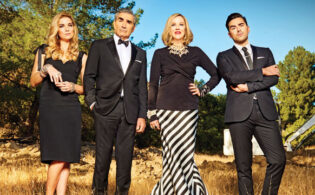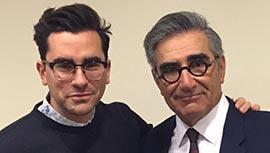PREMIUM: Actor, writer and producer Eugene Levy talks to World Screen about his performance as the patriarch of the down-on-its-luck Rose family in Schitt’s Creek, which earned him an Emmy nomination.
Levy has worked in comedy his entire career. An alumnus of Second City Television, which earned him two Emmys for writing, he co-wrote and co-starred with Christopher Guest in mock documentaries, including Best in Show. He got roles in several films, including Bringing Down the House and Father of the Bride II, often playing off-beat, eccentric characters. In 2013, he formed Not A Real Company Productions with partners and his son, Daniel, with whom he co-created and co-stars in the critically acclaimed comedy Schitt’s Creek.
WS: How did Schitt’s Creek come about; where did the idea come from?
LEVY: My son, Dan, approached me almost seven years ago, and for the first time in his life came up to me and said, Do you want to work with me on this idea for a television show? The idea quite simply was a wealthy family loses all its money. Because we were inundated at the time with shows like Keeping Up with the Kardashians and The Osbournes, it was like being a fly on the wall in the home of all this wealth. And what would happen if there suddenly was no wealth, what would that family dynamic be? As a dad, to be honest, it wouldn’t have mattered what the idea was, because it was such a wonderful thing to be working with my son! We started working on it and at a certain point in the story development, Dan found this old newspaper article about Kim Basinger, who had bought a town [Braselton, Georgia] for quite an amount of money and was hoping that [filmmakers] would go out and shoot movies there and they could put people up in hotels, but it didn’t work out. She, unfortunately, lost a lot of money, but that gave us the idea: what if this family bought a town as a joke and then they had to live in the town. That’s how it started.
WS: It doesn’t seem like the traditional sitcom because there are hilarious scenes but also some heartfelt moments of vulnerability. How do you walk that line?
LEVY: The original intention, and one of the reasons Dan came to me, was because of the sensibility I had in the movies I had worked on with Chris Guest: Waiting for Guffman, Best in Show and A Mighty Wind. Even though they were mock documentaries, they were based on solid character work. You have to hook the audience on the characters to make these films work as well as they do. In any movie, but certainly, in a comedy, you have to be invested in the characters. That was the sensibility Dan was looking at, and I’ve always dealt in character comedy for as long as I can remember—getting your laughs through character. If you do it well, then you can hook the audience into your characters in such a deep way that you can take them from laughs and then plunge some emotional depths as well—a bit of a roller coaster ride. And they will follow you all the way. That was the game plan: keep reality in your comedy, never step outside of your characters to get laughs, and don’t be afraid of getting into emotional or sentimental territory. Get your laughs through character rather than through jokes because there is more longevity with character comedy. As I said, if your audience can invest themselves emotionally in your characters, then the whole experience is much richer, rather than how fun is your next joke. Because when your jokes stop being funny, you have nowhere to go.
WS: Alongside the comedy, the show offers insights to human nature. What are the series’ main themes? Is one of them how people react to change?
LEVY: Yes, that’s one of them. That’s what we started out doing, which is the fish-out-of-water comedic take for this wealthy family that now has to live in a very poor rural setting. But once we got the fish-out-of-water scenario established in our first season, we were then able to focus on the characters themselves, flesh out some good character arcs and focus more on the relationships. That, to me, is when the show got really interesting, not that it wasn’t funny in its first season. You do have to lay out a lot of exposition in your first season to get some firm footing on the story you want to tell. Since then, it’s been more about who you are, not what you are. It’s the ability to tell a love story, whether it’s a heterosexual love story or a gay love story, and create a community that is virtually devoid of homophobia. That is the big plus—and I give my son Dan credit because he’s been the showrunner the past few years—the show [presents] a world that we don’t necessarily have in real life but wouldn’t it be nice if things were more like this.
WS: Tell us about the character you play, Johnny Rose. He’s different from other characters you’ve played.
LEVY: Yes, it’s like playing the straight man. While putting the show together, we realized there had to be a character—and it looked like it had to be Johnny, the head of the household—who would be the rock, the straight guy, so to speak, the guy who moves the story and tries to keep the family together. This is the driving force. In every successful comedy, that is usually a winning formula going way back to when I started watching television in the ’50s. Jack Benny, a classic comedian, was a very funny guy but his thing was to surround himself with very funny character actors, and he would simply react to what they were doing. And in his reactions, he gets laughter that is sometimes bigger than the laughs his supporting cast is getting. On The Mary Tyler Moore Show, somebody had to be the straight person and as good as Mary Tyler Moore was, she was the straight person surrounded by very funny characters. Even on Seinfeld, as funny as Jerry Seinfeld is, I would say he was the straight man in his own series—the guy that keeps the exposition and the story going and everybody else around him gets to have all the color, so to speak. That was the design for Johnny. He had to be this guy, and I got into it with great relish because it’s something that I had never done and really looked forward to. I’ve enjoyed playing this character for six years. The fact that I got an Emmy nomination for it was surprising because I think of myself as the straight man in the show and something doesn’t quite seem right about that in a way, right?
WS: What is the atmosphere on set? Do you keep cracking up or are you such professionals that you can move through the scene as you need to?
LEVY: We do crack up a lot I have to say! Usually, it’s Chris Elliot that gets me going because he is one of the funniest guys ever! I’ve been a fan of Chris’s for many years. He usually has my number on the set. There is some breaking up. If someone is screwing up a line, we can get some laughs out of that. It’s a good feeling on the set. There is no question that you know you are working on a comedy and that sentiment pervades the crew as well. It’s such a fun atmosphere to be working in. It’s no surprise that people feel they can do their best work in an atmosphere like that.
WS: Have you been surprised by the critical acclaim the show has received?
LEVY: I have not been surprised by the critical acclaim because when we started putting the show together, I knew that this was a good show. This was a show that I could be just so proud of. And my son Dan felt the same way, and we knew we had an amazing cast. We knew that the scripts were absolutely dynamite and the execution was terrific. We had a great production team and crew. I knew the show was good and it was well-received in Canada when it first came out. The problem was south of the border. We were on Pop TV and for the first few years, nobody knew what Pop TV was. Nobody knew how to find it. So even though I think they were fairly satisfied with the numbers they were getting in their first couple of seasons, generally speaking not a lot of people were watching the show south of the border until it arrived on Netflix. Then there was a huge turnaround. I noticed a big difference in terms of how many people were watching the show because more people were coming up to me and saying, Hey, I caught your show. Where did you see it? I saw it on Netflix. From that point, the awareness factor started percolating in the States.



